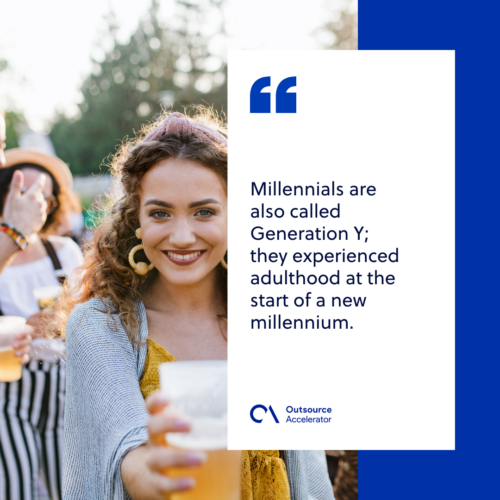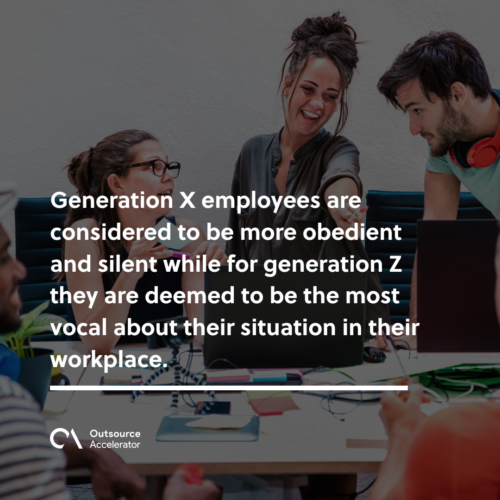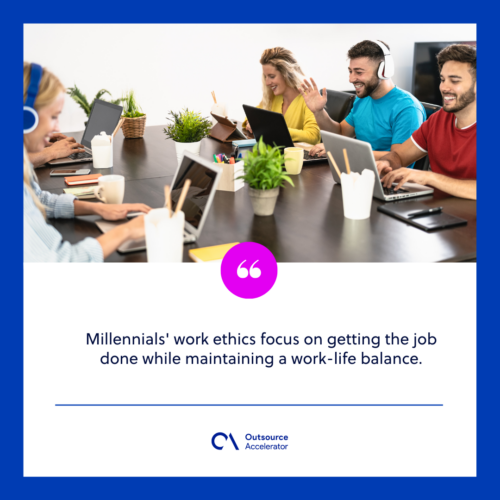What you need to know about millennials’ work ethics

There are many negative connotations associated with millennials regarding their work ethic.
However, they are undeniably a very knowledgeable and adaptable generation to work with amid technological evolution.
So, what are millennials’ work ethics? What do they contribute to today’s workforce? How do they cope with today’s innovations?
Who are the millennials?
It is known that each generation has its personality, and so do millennials. According to Beresford Research, millennials are people born from 1981 to 1996.
Millennials are also called Generation Y; they experienced adulthood at the start of a new millennium.
Moreover, they are incredibly good as they successfully adapted to the newness and changes of the world’s work environment.

How different are millennials’ work ethics from other generations?
Compared to other generations, specifically Generation X (Baby Boomers) and Gen Z, millennials have a far more different work ethic.
Different generations have their way of approaching and solving problems at work, given the era they’ve grown in varies.
Employees who are Baby Boomers are considered to be more obedient and silent. They are known for working without hesitation and arguments. This may be due to older generations experiencing less job stability.
While Gen Z is deemed the most vocal about their workplace and work-life balance situation.
Lastly, millennials are between the two, as they have experienced working with Generation X while undergoing technological evolution.

Stereotypes about millennials’ work ethics
Here we list down the common stereotypes connected to millennials’ work ethics:
Millennials are lazy workers
They are sometimes regarded as lazy employees. Others think they prioritize rewarding themselves after work or prefer to unwind even with a heavy workload.
Millennials don’t want work feedback
A millennial employee is also seen as someone not fond of receiving feedback, which is also a reason for them to be called arrogant. This stereotype highlights how millennials aren’t open to receiving constructive criticism that can help them improve.
Millennials don’t follow directions
Some millennials are presumed to be prideful. While following directions is required, others don’t easily follow through with their management or seniors’ lead.
Millennials have short attention spans
Some suggest that millennial employees have a shorter attention span and are easily distracted by technology and social media. Critics argue that this can lead to reduced productivity and a lack of focus in the workplace.
Millennials desire instant gratification
Another stereotype is that millennial employees expect immediate rewards and recognition for their work.
It is often said that they are less patient when it comes to career advancement. Although they may not be willing to put in the same amount of time and effort as previous generations before expecting promotions or raises.
What are considered millennials’ work ethics?
Now let’s uncover the reality of millennials’ work ethics:
Self-reliance
Interdependence when working is a known millennial work ethic. They are used to doing almost everything independently, and most of them like it more when they get the job done alone.
Also, most millennials strongly believe in the saying that a person must avoid dependence on others whenever it is possible. They are firm on wanting to be in charge of an activity they are doing and accept its consequences if they fail to fulfill the job.
Work centrality
They are focused on getting the job done while maintaining a work-life balance. This way, they can still live happily despite their hectic work schedule.
Millennials ensure they have time for leisure, friends, family, and other loved ones.
This is a good practice that should be passed on to future generations. Most people these days are so occupied with work that they don’t have spare time to enjoy themselves.
In turn, it causes them to feel easily drained and unmotivated.
There’s nothing wrong with giving yourself a work-life balance and the luxury of being happy.
Determination
Millennials are always determined to do bigger things. They always look for better ways to upskill and contribute more to the company they are working for. Moreover, this work ethic helps them with personal development and those with whom they are working to grow.
Work morality
Character and morality are strong features of millennials’ work ethic. They always consider what is acceptable and unacceptable behavior before making a decision. It just shows how they care about their co-workers.
Moreover, this proves how well-oriented and aware millennials are of what they should do, which could greatly affect their working environment.

The millennial mindset and how it affects millennials’ work ethics
Millennials are strong-minded people who are firm believers in what they want and what they know is right.
They know how to stand up for what they deserve, which often is perceived negatively by other generations as they think it is wrong and disrespectful.
This generation includes hardworking and determined individuals who give boundaries to their work and personal lives. They are motivated to pursue their goals and are always hungry for growth.
Millennials’ work ethics, in general, are influenced by the generations that have come before and after them. They have a unique understanding of blending in and coping with these two age groups in a workplace setup.







 Independent
Independent




